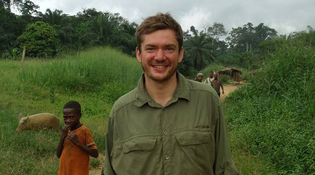 loading
loading
Light & VerityStudents help track Ebola in LiberiaYou heard about the quarantine. Here’s what you missed.  Courtesy Ryan Boyko ’18PhDPublic health student Ryan Boyko ’18PhD—shown here on a 2012 trip to the Democratic Republic of Congo—was hospitalized, then quarantined, after returning from Ebola-stricken Liberia last fall. He and a colleague were there to help track the disease. View full imageYou may have seen the headlines about Ryan Boyko ’18PhD, a Yale School of Public Health student who was admitted to Yale–New Haven Hospital in October over fears that he had contracted Ebola in Liberia. But less widely publicized is the work Boyko and his fellow student Laura Skrip ’19PhD were doing in Liberia. The United States was in a near panic about Ebola when the two returned from Liberia on October 11, and when Boyko felt ill not long afterward, his hospitalization set off a media frenzy. Although he twice tested negative for the disease, state authorities forced both students into a 21-day quarantine. They had been in Liberia to help track the epidemic. When a Liberian health official had asked Yale epidemiology professor Alison Galvani for help collecting and analyzing data, Galvani asked the students to go. Boyko has a background in computer science and has done research in Africa, and Skrip, who studies mathematical modeling, had been exposed to medical anthropology in Southeast Asia during college and grown interested in global health. The students are affiliated with the public health school’s Center for Infectious Disease Modeling and Analysis, which Galvani directs. A few days after the students flew to Monrovia, they realized a mobile app could help medical personnel deal with the epidemic. An epidemiologist and former Monrovian, Mosoka Fallah, had divided the capital into geographic sectors and set up a system for volunteers—“tracers”—to go into the sectors early each morning. The tracers were asking, house by house, who was sick, who was back from treatment, who had been orphaned, and so on. They scribbled their notes on paper and texted the information to Fallah. An app would make everyone’s job easier. To build it, Skrip enlisted her uncle, Thomas Snyder, an IT professional who’d previously developed an app for malaria surveillance in Uganda; and Snyder’s mentor Thomas Murray. Over several weeks of collaboration, the four of them refined the app, which allows tracers to collect standardized data and upload it instantly. Fallah and medical students in the city survey the data as it arrives and, as needed, send for an ambulance, decontaminators, or a body-removal team. Some of the data appear on a public website, too. Boyko hopes that, by providing a direct link between community need and government response, the app will help build Liberians’ trust in their leaders. For their parts, Boyko and his colleague were “admonished to play it extraordinarily safe.” Staying in a hotel near the US embassy with other international aid workers, they were chauffeured daily to the Ministry of Health and Social Welfare building. On the way, Skrip says, they listened to call-in radio shows in which Liberians discussed the epidemic; their driver also updated them on the “talk of the town.” At the ministry, they ate protein bars for lunch rather than venturing out. They slathered on Purell and avoided human contact. Boyko says that in Monrovia, most people continued to go about their business—but they were terrified, avoiding contact and washing up at stations outside each building. The city he saw was “a disaster zone, but where all the buildings are still standing.” Boyko plans to keep working on the Liberian app. He’s considering joining the CDC or Partners in Health in the future; he’d like to focus on putting existing solutions to work. “With the things we already know, and the tools we already have,” he says, “we could be saving so many more lives, so many more healthy life-years, than we are.”
The comment period has expired.
|
|